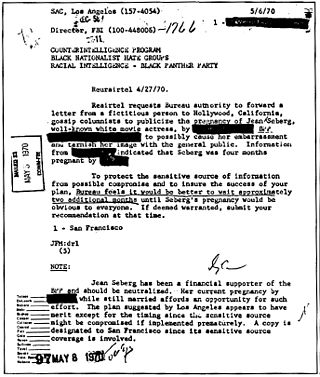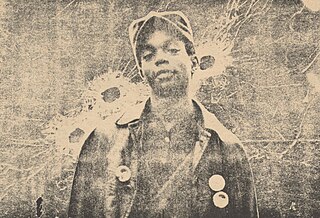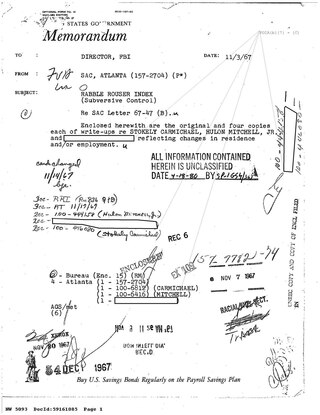Related Research Articles

COINTELPRO was a series of covert and illegal projects conducted between 1956 and 1971 by the United States Federal Bureau of Investigation (FBI) aimed at surveilling, infiltrating, discrediting, and disrupting American political organizations that the FBI perceived as subversive. Groups and individuals targeted by the FBI included feminist organizations, the Communist Party USA, anti–Vietnam War organizers, activists in the civil rights and Black power movements, environmentalist and animal rights organizations, the American Indian Movement (AIM), Chicano and Mexican-American groups like the Brown Berets and the United Farm Workers, independence movements, a variety of organizations that were part of the broader New Left, and white supremacist groups such as the Ku Klux Klan and the National States' Rights Party.

John Edgar Hoover was an American law-enforcement administrator who served as the final Director of the Bureau of Investigation (BOI) and the first Director of the Federal Bureau of Investigation (FBI). President Calvin Coolidge first appointed Hoover as director of the BOI, the predecessor to the FBI, in 1924. After 11 years in the post, Hoover became instrumental in founding the FBI in June 1935, where he remained as director for an additional 37 years until his death in May 1972 – serving a total of 48 years leading both the BOI and the FBI and under eight Presidents.

Robert George Seale is an American political activist and author. Seale is widely known for co-founding the Black Panther Party with fellow activist Huey P. Newton. Founded as the "Black Panther Party for Self-Defense", the Party's main practice was monitoring police activities and challenging police brutality in Black communities, first in Oakland, California, and later in cities throughout the United States.

Jean Dorothy Seberg was an American actress. She is considered an icon of the French New Wave as a result of her performance in Jean-Luc Godard's 1960 film Breathless.

Robert James Hutton, also known as "Lil' Bobby", was the treasurer and first recruit to join the Black Panther Party. Alongside Eldridge Cleaver and other Panthers, he was involved in a confrontation with Oakland police that wounded two officers. Hutton was killed by the police under disputed circumstances. Cleaver stated Hutton was shot while surrendering with his hands up, while police stated he ignored commands and tried to flee.

Fredrick "Chairman Fred" Allen Hampton Sr. was an American activist. He came to prominence in his late teens and very early 20s in Chicago as deputy chairman of the national Black Panther Party and chair of the Illinois chapter. As a progressive African American, he founded the anti-racist, anti-classist Rainbow Coalition, a prominent multicultural political organization that initially included the Black Panthers, Young Patriots, and the Young Lords, and an alliance among major Chicago street gangs to help them end infighting and work for social change. A Marxist–Leninist-Maoist, Hampton considered fascism the greatest threat, saying, "nothing is more important than stopping fascism, because fascism will stop us all."
A law collective is a non-hierarchical organization which provides legal aid to a community or communities in need. Such work ranges from traditional criminal defense, to advocacy on behalf of immigrants, to legal support at large and small protests, to "Know Your Rights" and other law-related workshops.

Alprentice "Bunchy" Carter was an American activist. Carter is credited as a founding member of the Southern California chapter of the Black Panther Party. Carter was shot and killed by a rival group, Ron Karenga's "Us", and is celebrated by his supporters as a martyr in the Black Power movement in the United States. Carter is portrayed by Gaius Charles in the 2015 TV series Aquarius.
Donald Freed is an American playwright, novelist, screenwriter, historian, teacher and activist. According to Freed's friend and colleague, the late Nobel Laureate Harold Pinter, "(Freed) is a writer of blazing imagination, courage and insight. His work is a unique and fearless marriage of politics and art."

Frederick "Fritz" Joubert Duquesne was a South African Boer and German soldier, big-game hunter, journalist, and spy. Many of the claims Duquesne made about himself are in dispute; over his lifetime he used multiple identities, reinvented his past at will, claimed family ties to aristocratic clans and famous people and even asserted the right to military titles and medals with no third-party verification.
Dhoruba al-Mujahid bin Wahad is an American writer and activist, Black Panther Party leader and co-founder of the Black Liberation Army. Dhoruba, in Swahili, means "the storm".

All Power to the People: The Black Panther Party and Beyond is a 1996 documentary directed by Lee Lew-Lee. The film chronicles the history of the Black Panther Party, leadership, and members. The film also briefly chronicles the history of the American Indian Movement and Black Liberation Army. The film covers assassinations and methods used to divide, destroy, and imprison key figures within the party. It is composed primarily of archival footage and interviews of former organization members and government agents. The documentary was broadcast in 24 countries on 12 networks in the United States, Canada, Europe, Asia and Australia between 1997 and 2000.

The Black Panther Party was a Marxist–Leninist and black power political organization founded by college students Bobby Seale and Huey P. Newton in October 1966 in Oakland, California. The party was active in the United States between 1966 and 1982, with chapters in many major American cities, including San Francisco, New York City, Chicago, Los Angeles, Seattle, and Philadelphia. They were also active in many prisons and had international chapters in the United Kingdom and Algeria. Upon its inception, the party's core practice was its open carry patrols ("copwatching") designed to challenge the excessive force and misconduct of the Oakland Police Department. From 1969 onward, the party created social programs, including the Free Breakfast for Children Programs, education programs, and community health clinics. The Black Panther Party advocated for class struggle, claiming to represent the proletarian vanguard.

The FBI Indexes, or Index List, was a system used to track American citizens and other people by the Federal Bureau of Investigation (FBI) before the adoption of computerized databases. The Index List was originally made of paper index cards, first compiled by J. Edgar Hoover at the Bureau of Investigations before he was appointed director of the FBI. The Index List was used to track U.S. citizens and others believed by the FBI to be dangerous to national security, and was subdivided into various divisions which generally were rated based on different classes of danger the subject was thought to represent.
The Tucson Five was a group of house-mates from Los Angeles who were, despite a lack of evidence, alleged by the FBI to have been participants in the Weather Underground. Their case is notable because of the way in which grand jury proceedings and contempt of court charges were used against the group by Guy L. Goodwin of the United States Department of Justice, ultimately leading to a successful appeal to the Supreme Court by one member of the group. The case is additionally notable because the FBI breached the group's attorney–client privilege via wiretaps and black bag jobs.
Guy Lee Goodwin was an American lawyer, and chief of the Special Litigation service of the criminal division of the United States Department of Justice. He was notable for his use of grand juries in attempts to investigate the Weather Underground, and was characterized, by the prominent reporter Jack Anderson, as "President Nixon's 'Witch-Finder General'".
The DETCOM Program, along with the COMSAB Program formed part of the "Emergency Detention Program" (1946–1950) of Federal Bureau of Investigation (FBI). As FBI historian Athan Theoharis described in 1978, "The FBI compiled other lists in addition to the Security Index. These include a "Comsab program", and "Detcom program", and a Communist Index

William O'Neal was an American FBI informant in Chicago, Illinois, where he infiltrated the local Black Panther Party (BPP). He is known for being the catalyst for the 1969 police/FBI assassination of Fred Hampton, head of the Illinois BPP.
References
- 1 2 Newton, Michael (2003). The FBI Encyclopedia. McFarland & Company. p. 329. ISBN 9780786417186.
- ↑ M. Wesley Swearingen (1995). FBI Secrets . Boston: South End Press. ISBN 0-89608-501-5.
- 1 2 Kick, Russ (2004). Disinformation Book of Lists. Red Wheel Weiser. ISBN 9781609258894.
-Olsen, Jack (2001). Last Man Standing: The Tragedy and Triumph of Geronimo Pratt. Anchor Books. p. 275. ISBN 9780385493680. - ↑ Schultz, Ruth (2001). The Price of Dissent: Testimonies to Political Repression in America . University of California Press. p. 443. ISBN 9780520224018.
M. Wesley Swearingen.
- ↑ Jensen, Carl; Project Censored (1996). Censored 1996: The News That Didn't Make the News . Seven Stories Press. p. 132. ISBN 9781888363012.
- ↑ Burrough, Bryan (2015-04-07). Days of Rage: America's Radical Underground, the FBI, and the Forgotten Age of Revolutionary Violence. Penguin. ISBN 9780698170070.
- Wesley Swearingen, M. (1995). FBI Secrets . South End Press. ISBN 9780896085015.tucson five.
- ↑ Crewdson, John M. (January 21, 1979). "Former Agent Cites Illegal FBI Affairs". Ocala Star-Banner. Ocala, Florida. p. 8B. Retrieved July 2, 2015.
- ↑ Stewart, Bhob (2015). "All Power to the People! The Black Panther Party and Beyond (1997)". Movies & TV Dept. The New York Times . Archived from the original on 2015-04-15. Retrieved May 28, 2015.
- ↑ White, Bill (September 28, 2006). "'U.S. vs. John Lennon' shows the breadth of government paranoia". Seattle Post-Intelligencer. Retrieved May 28, 2015.
- ↑ "Mont Wesley Swearingen, 1927-2019". Legacy.com. November 13, 2019.